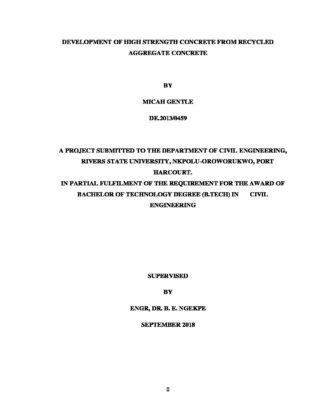Description
ABSTRACT
The study set out to ascertain the extent to which financial institution have helped in the economic development of Nigeria. The fundamental issue in Nigeria today is the manner in which it can break away from the grip of poverty and under development one of the objective of this study is therefore the examine to the role of financial institution in development of Nigeria using their bringing together the small scattered saving surplus unit in the country and deficit borrowers for creations since there is an empirical evidence that development can not occur without high availability in the economy. The design show that this research is simply the process of arising at a dependable solution to problem through the planned and systematic collection analysis and interpretation of data. Sample size and sampling techniques is 124. The strategies random sampling technique was used. Method of data collection, the interview for collection of more facts and clarification (primary and first hand information). The questionnaires were administered to the bank customers and to the bank staff and management through with a lot of difficulties. Method of data analysis, for the purpose of this data analysis that follows in this part of the work, the following data analysis tools have been extensively use, we use simple percentage to analyse. The finding showed that: (i) Low credit availability to potential investors inhibits capital formation in commercial bank. This was uncompleted agreement (ii) Financial institution have been in the mobilization of saving and channeling such to long-term university. Based on findings it was recommended among other the central bank should release certain policies in other to enable bank grant more long term loans to investors. This should mothy an creats in preferred sectors of economy life manufacturing agriculture technology and food estate.
TABLE OF CONTENTS
Title page
Approval page
Certification
Dedication
Acknowledgment
Table of Contents
Abstract –
CHAPTER ONE
1.0 INTRODUCTION
1.1 Background of the study
1.2 Statement of the problem –
1.3 Purpose of the study
1.4 Significance of the study
1.5 Research questions
1.6 Scope/Delimitation of the study
1.7 Limitation of the study
1.8 Definitions of terms
CHAPTER TWO
2.0 REVIEW OF RELATED LITERATURE
2.1 Conceptual Framework
2.2 The Central Bank Control Measures and Economic Development in Nigeria
2.2.1 The Quantitative Technique
2.2.2 The Price of Money on Credit
2.3 The Role of Financial Institution
2.4 Performance Assessment of CBN and other Financial Institution to Economic Development of Nigeria
2.5 Problems of Financial Institution
2.5.1 Summary of Review
CHAPTER THREE
3.0 RESEARCH METHODS
3.1 Research design
3.2 Area of study
3.3 Population of the study
3.4 Sample Size and Sampling techniques
3.5 Instrument for Data Collection
3.6 Method of Data Collection
3.7 Validation and Reliability of the Instrument
3.8 Method of Data Analysis
CHAPTER FOUR
4.0 DATA PRESENTATION AND ANALYSIS
4.1 Analysis of Research Data –
CHAPTER FIVE
SUMMARY OF FINDING, CONCLUSION AND RECOMMENDATION
5.1 Summary of Findings
5.2 Conclusion
5.3 Recommendation
5.4 Suggestion for further Studies
References
Appendix
Questionnaire
